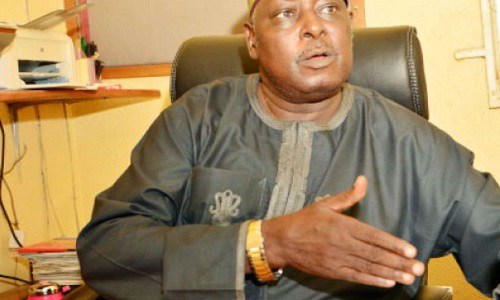
The Senate on Thursday hit back at the Secretary to the Government of the Federation, Babachir Lawal, after he dismissed the legislative body as saying “balderdash” over the call for his removal and prosecution.
The Senate had on Wednesday asked President Muhammadu Buhari to suspend Mr. Lawal and ensure his prosecution over alleged breach of Nigerian laws in handling contracts awarded by the Presidential Initiative for the North East, (PINE).
An ad-hoc committee of the Senate on “mounting humanitarian crisis in the North East” led by Shehu Sani submitted its interim report on Wednesday and indicted Mr. Lawal for allegedly receiving N233 million contract to clear invasive plant species in Yobe State through a company, Rholavision Nigeria Limited.
The Senate alleged he remained a director of the company till September 2016, over a year after his appointment, in breach of Nigeria’s code of conduct for public officials as enshrined in the 1999 constitution.
Rholavision was incorporated in 1990 by Mr. Lawal, he confirmed, to carry out information and communication technology services.
But it was found by the Senate to be handling a N233 million bush clearing contract in the North East in 2016.
The Yobe State Government said the contract was never executed.
But less than an hour after the Senate indicted him and called on authorities to punish him, Mr. Lawal accompanied his principal, Mr. Buhari, to the National Assembly to present the 2017 budget proposal.
After the presentation, Mr. Lawal told journalists the Senate was only victimising him and trying to “rubbish” his personality.
“The senate is talking balderdash; it has developed the habit of bring-him-down syndrome,” he said.
“I have the report of the senate committee in which it was said that I didn’t resign from Rholavision Nigeria Limited. Let me tell you, Rholavision was formed by me in December 1990, and it has been a company that was run very successfully.
“Now, when I was appointed secretary to the government of the federation, I resigned from that company on 18th August 2015. I can see that in their report, they are talking about 2016. I don’t know where they got their facts.
“By the way, it is very instructive that when the committee was sitting, no effort was ever made to invite me to come and make submission. It is therefore, surprising that they devoted a whole session of today (Wednesday) at maligning me, claiming what is not true without even giving me the chance to come and put my own case before them.”
But on Thursday when the Senate resumed, Dino Melaye brought the matter up, saying his privilege and that of his colleagues were breached by Mr. Lawal.
The Senate insisted on its committee’s findings and Senators took turns to lambast Mr. Lawal.
“President should review how somebody like Babachir Lawal managed to get into this government,” said Chukwuka Utazi (PDP-Enugu).
Also commenting, Mr. Saraki said the Senate had played its role of exposing Mr. Lawal and that the onus was now on the executive “in a government that is fighting corruption” to do the needful.
“But I know Nigerians are watching,” said Mr. Saraki, adding that the Senate would directly communicate its resolutions that Mr. Lawal should be suspended and prosecuted to the President.
Later, the chairman of the committee that indicted Mr. Lawal, Mr. Sani (APC-Kaduna), spoke with PREMIUM TIMES exclusively and insisted Mr. Lawal lied in the claims he made.
He said Mr. Lawal was invited contrary to his claim.
“We invited him but he sent a representative,” said Mr. Sani.
On the claim of resigning from the company last year before the contract was even awarded in March 2016, Mr. Sani said, “we got to know from the Corporate Affairs Commission (that he held directorship till September 2016).
“We wrote the Corporate Affairs Commission and they supplied us the information.”
He said there was more the committee would reveal regarding how officials and companies criminally benefited from the North East crisis when the Senate resume next year.
PremiumTimes
END

His is a case of conflict of interest and must be treated as such if the law of the land is averse to such behaviour.